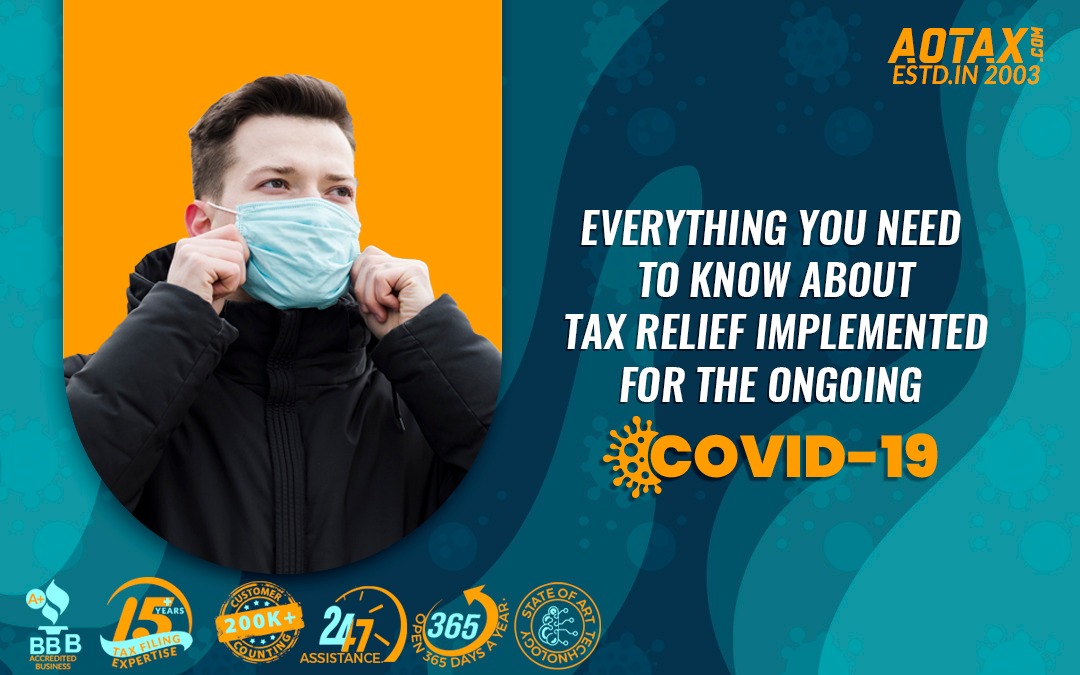
Everything you need to know about tax relief implemented for the ongoing coronavirus disease 2019
Everything you need to know about tax relief
implemented for the ongoing coronavirus disease 2019
The dreadful coronavirus disease has taken a toll on the global economy. Businesses are suffering from losses and employees are losing their jobs. In such a situation, tax compliance is an additional factor of stress on the common people and business entities as well. In such difficult times, the US Government has taken an initiative and introduced certain changes to federal tax laws.
Extension in federal tax deadlines
The US Department of Treasury and the IRS issued Notice 2020-17on 18th March 2020. According to the guidelines of this notice, there has been an extension in the deadline for payment of federal income tax or federal tax return. Any taxpayer having a federal income tax payment or federal income tax return due on 15th April 2020 can file the returns by 15th July 2020. This extension of 90 days has been provided by the IRS without charging any penalties or interest for late filing. This tax relief is applicable for all taxpayers who include individual, trust, estate, partnership association, corporation, etc.
The affected taxpayers do not need to file the forms Form 4868 or Form 7004. Also, there is no limitation on the amount of payment that might be postponed. This relief on taxes is applicable for the Federal Income tax and Federal tax return of 2019 and for the estimated federal income tax payment of 2020 which were due on 15th April 2020. However, no extension has been announced for the filing of any other type of federal income tax or federal tax return.
Extension in State tax deadlines
The majority of the States have agreed to the tax changes implemented by the Federal Government and have responded accordingly. However, there are some states which have responded differently to these tax changes implemented by the Federal Government. Taxpayers can obtain all information related to the changes in State tax laws from their state tax agencies.
Contributions to IRA
With the changes in the deadlines for tax payment and filing of tax returns for the federal tax, the deadline for making contributions to IRA has also been extended. The deadline for making contributions to the IRA has been also extended to 15th July 2020. This extension of 90 days for making contributions to the IRA has been provided by the IRS without charging any penalties or interest.
Taxpayers can contribute a maximum amount of $6000 towards their IRA and if the taxpayer is above the age of 50 years then there can be an additional contribution of $1000.This is an excellent opportunity for the taxpayers to save more for their retirement if they have not done so.
Contributions to HSA
Along with the extension made in filing federal tax payments and federal tax returns up to 15th July 2020, the deadline for making contributions to HSA has also been changed to 15th July 2020.
In case if the taxpayer is having a high –deductible health insurance plan with an HSA then he can add up to $3500 if he has self-only coverage. This amount can be increased to $7000 in case of family health plans. In the case of the taxpayer being above the age of 55, a contribution of an additional $1000 can be made into the account.
The stimulus package and
Families First Coronavirus Response Act
The Stimulus package will help the taxpayers in obtaining stimulus checks. These stimulus checks would of amount $1200 for the individual taxpayers, $2400 for those who are filing tax returns jointly and $500 for each qualifying child. These payments related to the stimulus package would be done by using the tax information of the taxpayers based on their recent tax filings. The amount which would be paid would be reconciled on the next year’s tax return based on the taxpayer’s situation in 2020.
The Families First Coronavirus Response Act helps in providing relief to the individual taxpayers as well as self-employed individuals and small businesses. The eligible employees who have been impacted by the coronavirus would receive emergency sick leave and paid sick leave.
Under FMLA (Family Medical Leave Act), if an employee needs to be quarantined, took care of a family member who was quarantined or took care of minor children whose schools/child care centers are closed due to COVID-19 can avail 12 weeks of job-protected leave. Also, if an employee is himself seeking medical supervision or is being quarantined then he would be eligible to receive two weeks paid sick leave and two-thirds pay for the care of the family member/child.
Furthermore, self-employed taxpayers and small business owners can obtain tax credits for providing paid sick leave and emergency family medical leave to the employees. Self-employed taxpayers can obtain a tax credit which is equivalent to the qualified sick leave amount whereas they can obtain a refundable tax credit equivalent to 100% of a qualified family leave amount. Small business owners are eligible to obtain refundable tax credits equivalent to 100% of both the qualified paid sick leave and qualified family leave wages.
Conclusion
Hence, with the implementation of these tax relief strategies by the US Government the stress of the taxpayers would be reduced up to some extent until things return to square one.
References
- https://www.irs.gov/pub/irs-drop/n-20-18.pdf
- https://blog.turbotax.intuit.com/tax-news/families-first-coronavirus-response-act-everything-taxpayers-need-to-know-about-the-new-relief-bill-46430/
- https://blog.turbotax.intuit.com/tax-news/is-the-tax-deadline-delayed-what-to-know-about-coronavirus-covid-19-and-your-taxes-46320/

Recent Comments